Website surveys are one of the most effective methods of collecting customer feedback. You can use them for a variety of tasks, such as improving the customer experience and increasing conversions.
The key to a successful survey is asking the right types of survey questions at the right moment. You need to send the questions when visitors are more likely to participate and share their thoughts.
In this post, you’ll discover 20 crucial website survey question examples.
Website survey question examples
No matter what kind of website you run and what product or service you sell, you can use these question examples to get inspired.
1. What was your first impression when you entered the website?
The first impression matters. The website of a bank should be trustworthy, while the website of a high-end fashion e-commerce store should look glamorous. Visitors should see what the site is about and what they can do on it.
Tip: Ask this question on the main page, and target new visitors only. Not sure how to do this? With Survicate, you can set display rules for specific pages and audiences.
Here’s a great starting point: use our first impressions survey template:
2. How did you hear about us?
Apps such as Google Analytics show where your website visitors came from, including Google Ads or Facebook campaigns, organic search, and other channels.
But there’s one unknown: direct traffic. Also, people who visit your website through Google Ads or organic search might know your brand already and it’s not their first visit.
Asking this question will help you find out the strongest marketing channels and where people meet your brand. You may discover that your assumptions could be completely wrong.
Tip: Target new visitors, as there’s a higher chance they remember how they found out about you. If you are looking for inspiration, here is a simple step-by-step guide on how to create “How did you hear about us” questions.
Or even better, try out this survey template and start asking your visitors how they found out about your brand or website.
💡 YOU MAY ALSO BE INTERESTED IN: Key buying criteria research survey template
3. What was the one thing that almost stopped you from buying?
Post-purchase surveys can help you optimize your customers’ purchase paths and increase sales. Ask new customers what almost caused them not to buy and turn their answers into conversion rate optimization hacks for your website.
For a real-life example of how this survey can help your business, take a look at this case study. In short, you can find out how Packhelp, an online marketplace for custom packaging, used Survicate to run NPS and CSAT surveys, collecting more than 30,000 customer responses in the process.
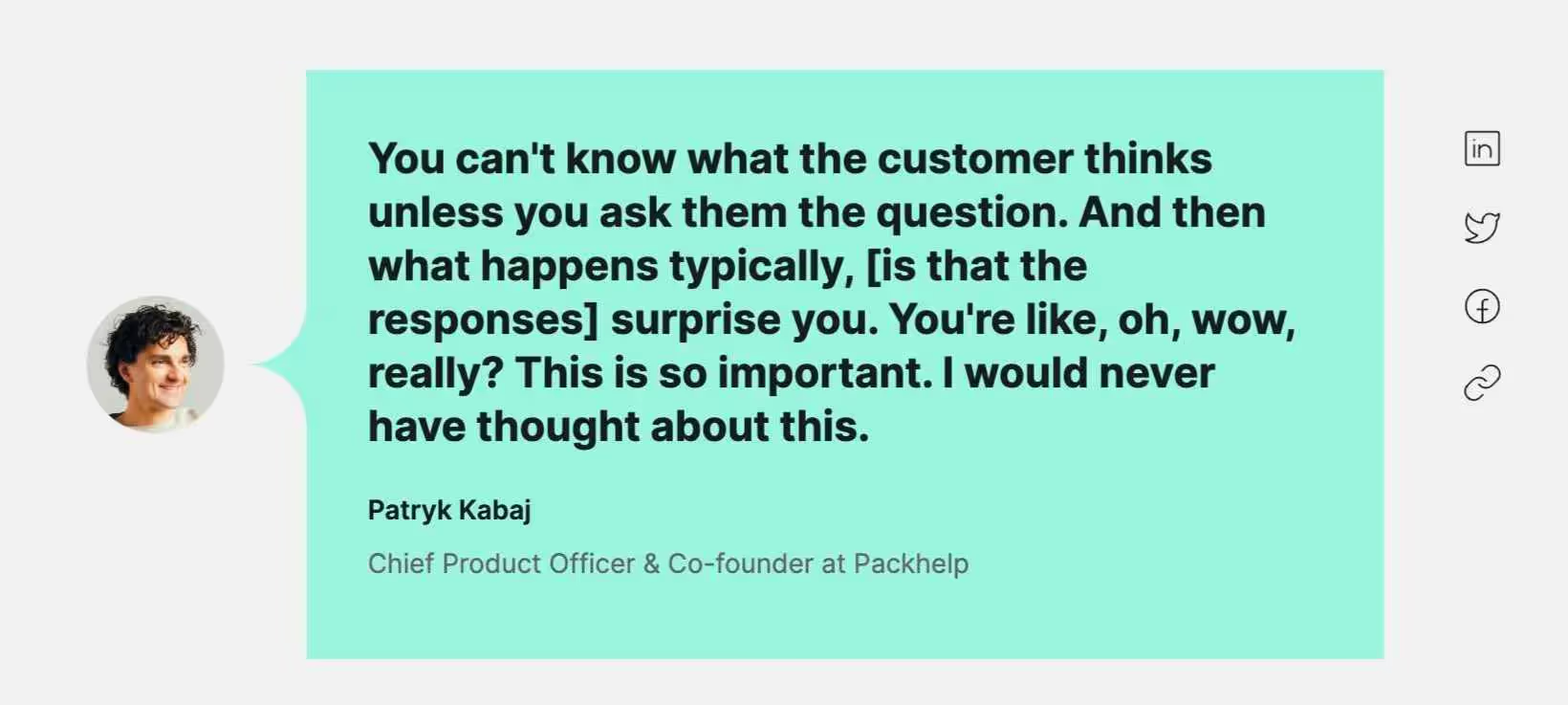
Tip: Ask this question on a ‘thank you’ page or on the first page new users see after creating an account (for SaaS companies).
You can use this post-purchase survey template completely free of charge. Paste it onto your website and find out why your customers almost failed to place an order.
💡 YOU MAY ALSO BE INTERESTED IN: ‘What stops you from signing up?’ survey template
4. How likely are you to recommend us to a friend or colleague?
This survey measures your Net Promoter Score, and it’s a popular way to gauge the overall attitude toward your brand.
Track changes over time and spot your potential brand ambassadors. Find out what distractors dislike and improve your score over time. In Survicate’s dashboard, you can easily see the state of your NPS score. And for even more insights, combine Survicate with a CRM such as Hubspot.
Tip: Target people who bought something (based on cookies or history of browsed pages) or visited your website multiple times. If you want to get serious about surveying your customers, take a look at our customer satisfaction survey guide.
Measuring NPS with Survicate takes only a few clicks, and with the template below, it can be set up within minutes.
5. Is there anything missing on this page?
Every page on your website should give visitors all the information they need. It works for all businesses: a news website should give readers all the information they need about a specific event, product pages on e-commerce websites should show a product, its variants, price, etc., and an FAQ section should aim to answer all the questions a visitor might have.
This template will come in handy if you want to make sure you match the expectations of your users:
Tip: Set this question to appear after a visitor scrolls 75% of a page or more. These users already know what the page contains, and they can tell if something is missing.
Here’s a great survey template you can use for this purpose:
6. Which of our competitors did you consider before choosing us?
Know your competitors; you can learn a lot from them. But to do it, you must know who you compete with. Sometimes you might be surprised who is considered to be your competitor, especially in the SaaS industry, where the features of different tools might overlap.
Tip: Use this question in a post-purchase survey.
You can also use the template below to learn more about your customers’ buying process and outsmart your competition.
7. What is the primary reason for choosing us over our competitors?
Learn what drives people to choose you over the competition. There are countless possible reasons, and knowing them will help you capitalize on them. For example, asking this very question taught us that many people choose Survicate because we offer direct integrations with the tools they already use.
Tip: Use this question in a post-purchase survey.
8. What makes us stand out from the competition?
People might be buying from you for many reasons, from the lowest prices on the market to your strong and appealing brand. Find out what makes you different from your competitors and highlight those features in your messaging to acquire even more customers.
Tip: Ask this question to your existing customers.
You can use this template to find out what sets you apart from the rest of the pack and find out what your unique selling point is according to your customers.
Alternatively, try asking this question for some more detailed insights:
9. What other products (or product features) would you like us to offer?
People might be reluctant to buy if you don’t offer exactly what they need. E-commerce website visitors might expect different products (learn more from this Survicate customer story), and potential customers of SaaS companies might want you to add new features to your product.
Answers to this product question will show you what potential customers want. SaaS companies can build a customer-driven product roadmap and prioritize building new features by asking this question at the right time.
This is a good question to get your customers thinking about the things you could improve in your product:
10. What is the most important feature of our product?
Even the simplest SaaS tools often have many features. You might be surprised at how many customers choose you because of a small feature you don’t even think about. Why? Because these are the features that make you different.
Find out what the most important features of your product are and highlight them if they are hard to find. Also, think about driving users to them during the onboarding process so they find these features more easily.
Tip: Target returning registered visitors with this question.
11. Which of the following tools do you use?
With a growing number of SaaS tools, integrations can be key to making your tool stand out. People often decide to buy a certain product because it’s integrated with the tool stack they already use.
But how do you decide what integrations to build? We faced this problem and resolved it by asking our newly registered users what tools they use. Their responses showed us what to focus on, and helped us create more effective onboarding.
Tip: Target your newly registered users.
You can also use this survey template to get immediate insights about what tools your customers are using:
12. What made you exit the website?
Sooner or later, all visitors will leave your website. What should worry you is how many visitors leave your website immediately or shortly after landing on a page.
Maybe the website loads slowly or looks bad on certain devices, or the value proposition is not clear enough. Find out what the problem is and reduce bounce rates to improve your conversion rate and content marketing and SEO metrics.
Tip: Use an exit intent survey targeting people who visited just one page during a session. You can use the template below that comes with just this question. Simply place it on a page that needs testing, and you’ll quickly have all the visitors’ answers in your Survicate dashboard.
13. What would you like us to write about next?
All content marketers dream of creating articles that bring thousands of new visitors and turn those visitors into customers. But the truth is that it’s almost impossible to achieve without understanding what your visitors want to read about. Returning visitors are a huge advantage in your marketing strategy.
This loyal group will help you promote your blog, and maybe they will even convert into buyers. So, how do you get loyal readers? Write about what they want to read, and increase client engagement with a content preferences survey.
Tip: Ask this question on a blog when a person scrolled 80% of a page or more. At this point, you can assume they read or at least scanned the post. Use a content research tool such as Survicate to get access to ready-made surveys.
14. What’s the most important feature we should add?
SaaS vendors, how often do you hear from customers that you should add a certain feature? It’s easy to get lost in the suggestions of many users, so you should structure your process of collecting feedback about new features.
Ask your users what they would like to add. It will help you build a good product roadmap.
Tip: Target returning registered visitors. You can use a survey on your website or in your product to ask this question, too:
If you already know you have several features you can take care of, you’ll need to prioritize. To help you choose the most important features, use this survey template:
15. What are your 3 favorite blogs?
Guest blogging is an effective and popular way of expanding your reach and getting in front of a new audience. But how do you find a good blog to write an article for? Or, how do you find a blog to get inspired by?
Just ask your users about their favorite blogs. This will give you insights into the kind of content they find appealing.
Tip: Target the readers of your blog and active users for the most relevant comments.
16. What is your preferred payment/delivery method?
For some people, the fact that you don’t offer their preferred payment or delivery method is enough to quit shopping. So make sure you offer all methods popular with your visitors. To identify them, you can look into your payment analytics, but also run a quick survey.
Tip: Target all visitors who browsed at least 5 pages. Use sampling to get the most accurate results.
💡 YOU MAY ALSO BE INTERESTED IN: Checkout experience survey template
17. Is our pricing clear to you?
Creating a good pricing structure is a huge challenge for all SaaS companies. At Survicate, we offer different subscriptions packed with different features. For us, the distinctions between plans are crystal-clear. But are they clear to visitors? Not always.
Tip: target visitors who spend more than the average time on your pricing page. Also, use skip logic and ask a follow-up question: ‘How can we improve it?’ when someone answers ‘No’ to the first question.
You can also use this free Pricing Survey Template to find out how visitors feel about your pricing. You can embed it on your pricing page or anywhere else on your website (for example, on comparison pages).
Or you can try this template to gauge your customers' price sensitivity if you’re testing the waters with a new pricing plan:
18. What is the goal of your visit?
People have different reasons for visiting your website. Some want to check what you offer, some want to compare you against competitors, some want to buy, and some want to read an article on your blog.
Tip: Target all visitors. Once some of them answer, ask them another question when they are about to leave the website, for example: ‘Did you meet the goal of your visit?’.
The ideal question for this situation can be found in one of our survey templates:
19. Did this article answer all your questions?
What’s the simplest way to reduce the amount of work for your support team? Create a knowledge base where users can find answers to the most commonly asked questions without the need to contact support.
Asking this question in the knowledge base will help you improve the quality of articles (if they need an upgrade) and decrease the number of support tickets.
Tip: Run this survey on articles in the knowledge base. Trigger it when readers scroll past 75% of the page.
An effortless way to get an answer to this question is with a short survey:
20. What do you like the most/the least about our website?
Ask this question if you’re planning any changes to your website. It’s better not to change the elements your visitors love because they will feel confused when they return. Start with changing what people feel conflicted about.
Tip: Target returning visitors and use a survey template such as this one to get feedback on your website content:
If you’re interested in more specific questions, take a look at these articles:
- Website Usability Questions: All You Need to Start
- 5 Most Crucial Website Satisfaction Survey Questions
- 5 Most Effective Website Redesign Survey Questions
- Microsurveys: When and How to Use Them Properly
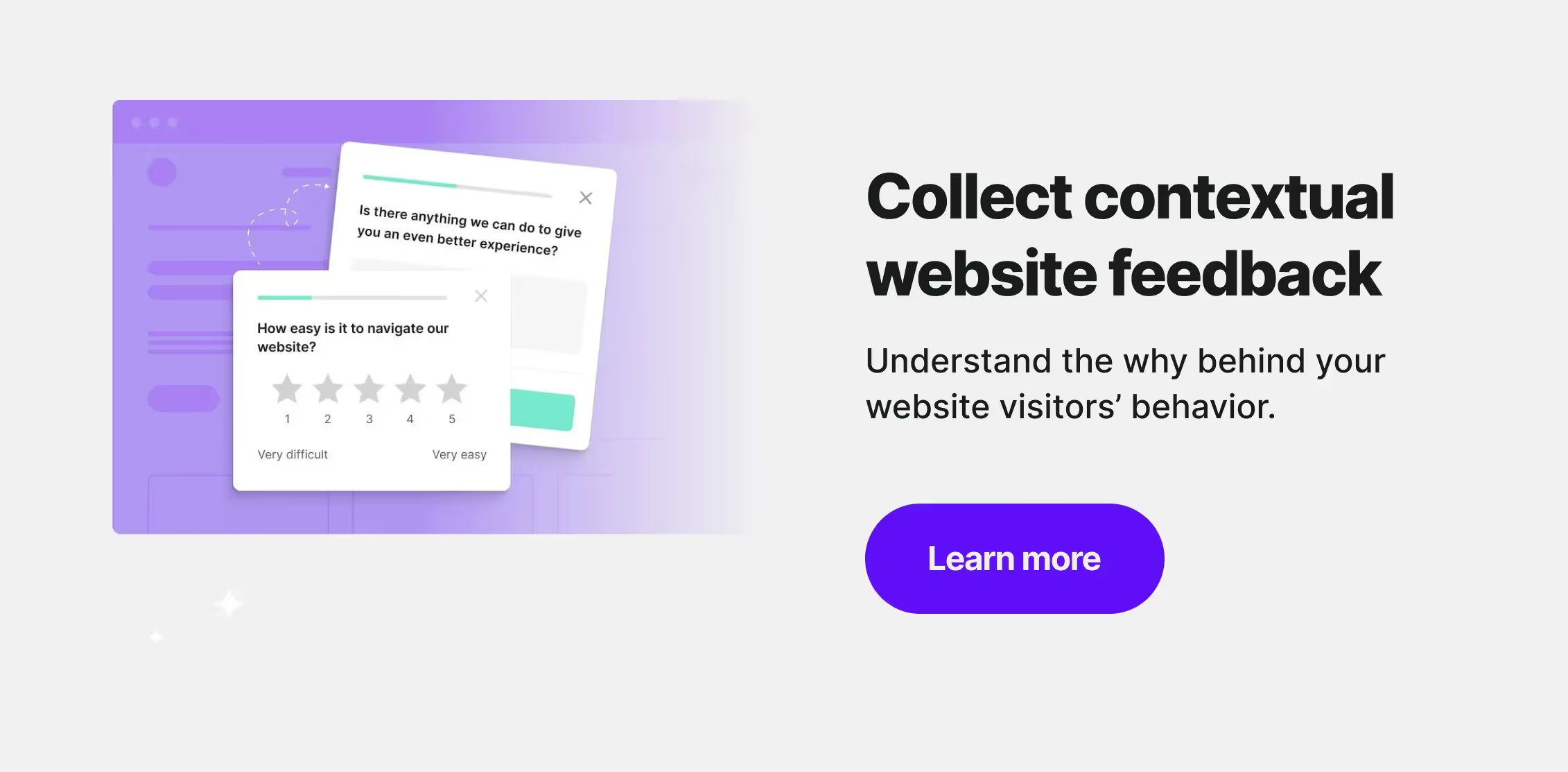
Use your website to capture customer feedback
This set of website feedback questions is a good way to start your adventure with website surveys. If you want to use different questions, make sure they comply with the rules of creating an effective survey to secure high response rates and a good user experience. You'll find them in our survey best practices post.
Remember that creating surveys doesn’t have to be a chore. The right survey software will help you create them in minutes so you can collect feedback and act on it right away.
If you want to try some of the survey templates mentioned in this article, just sign up for our 10-day free trial and enjoy access to all of the Best plan features today!

.avif)






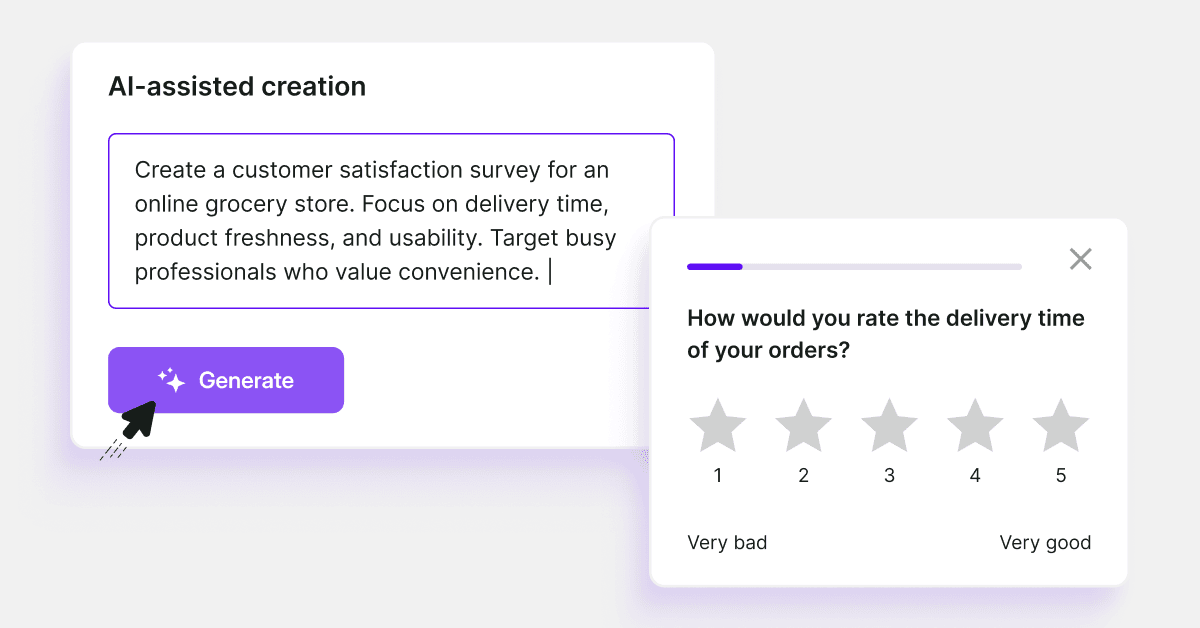
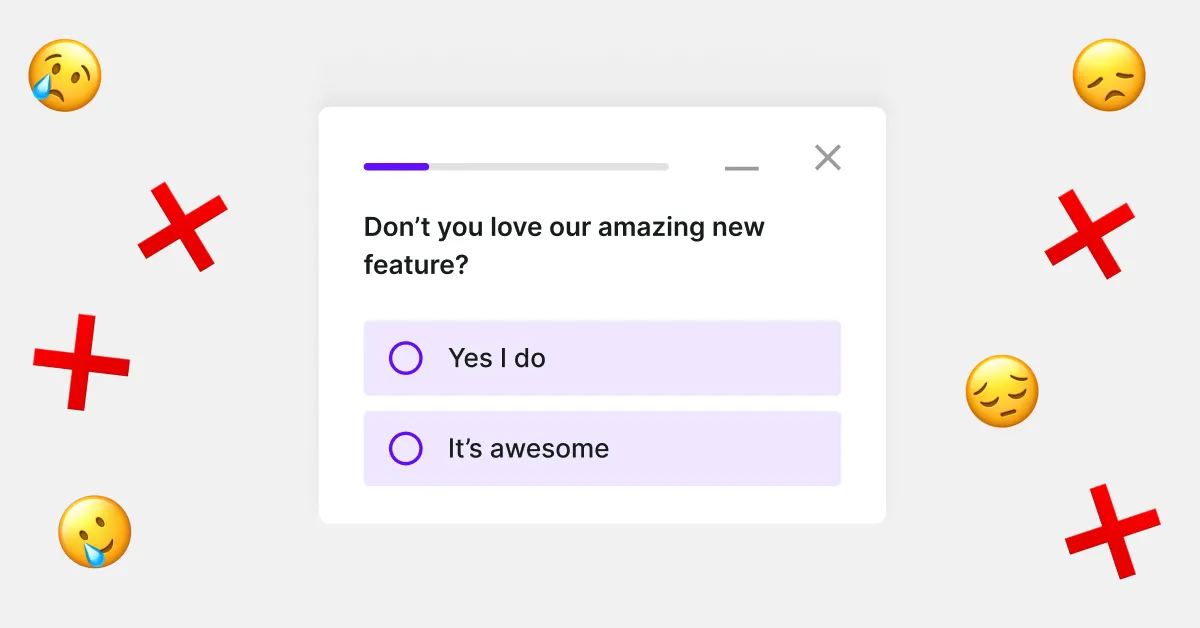
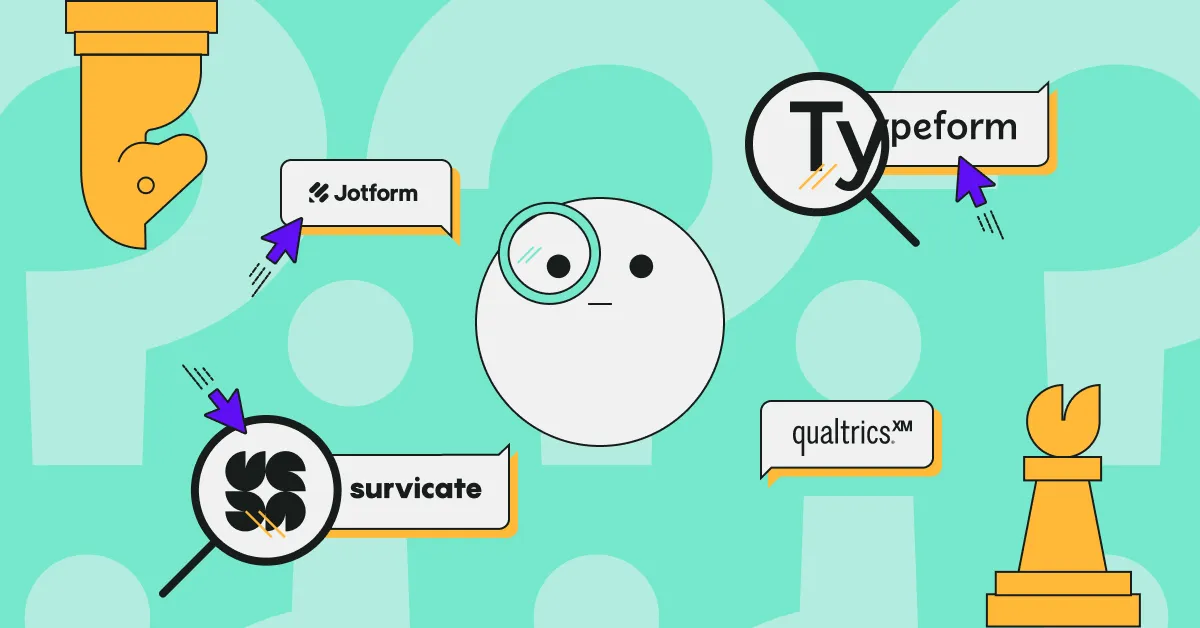


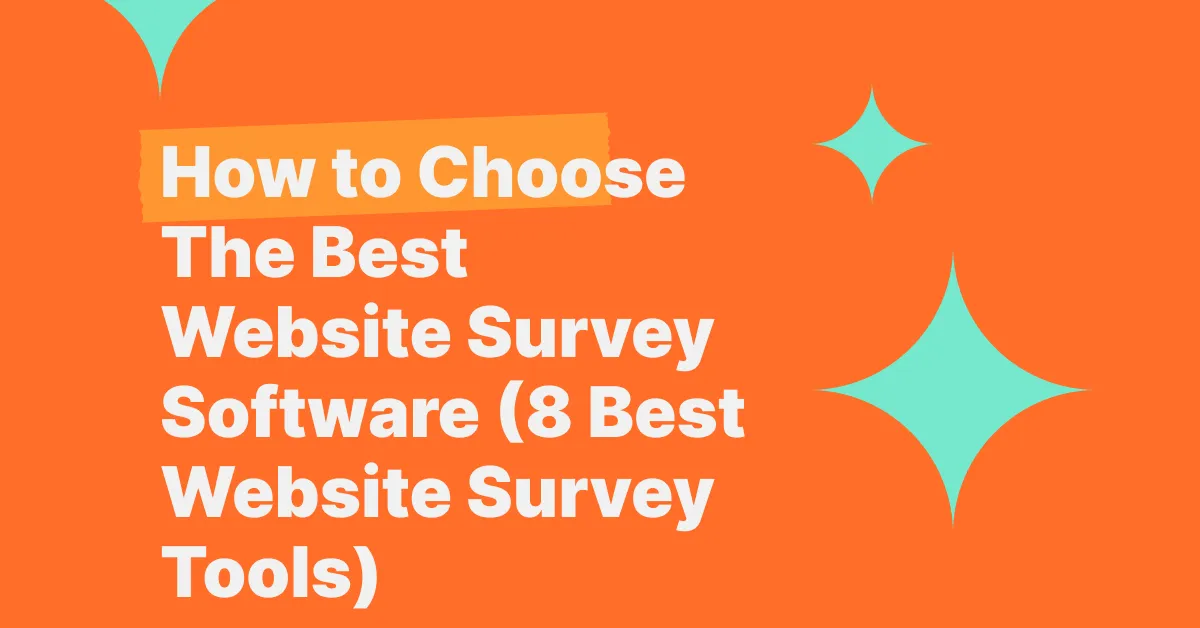
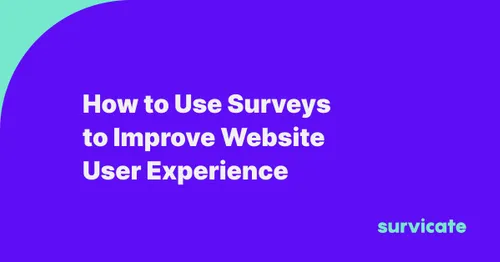
.svg)

.svg)


